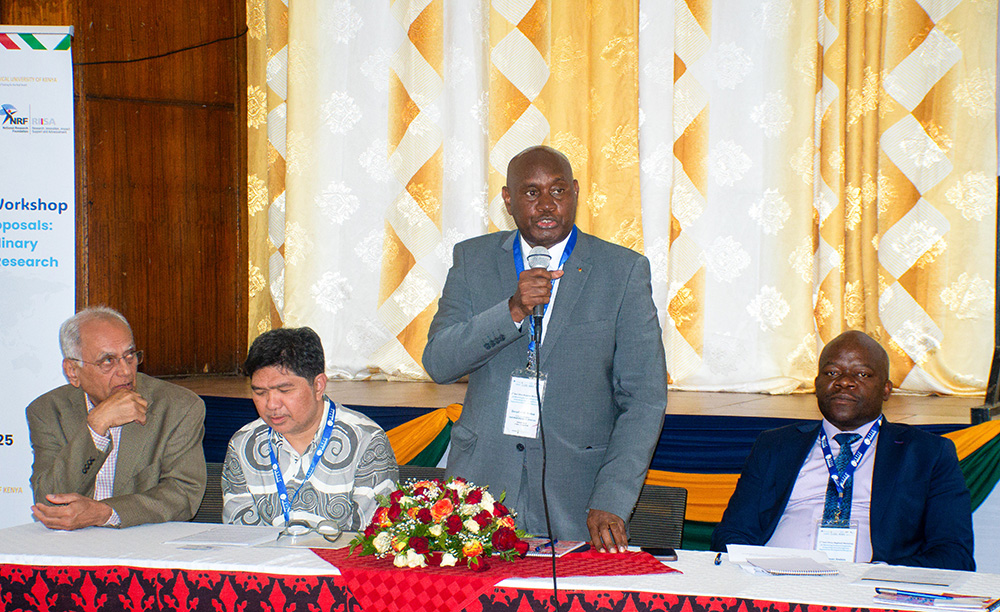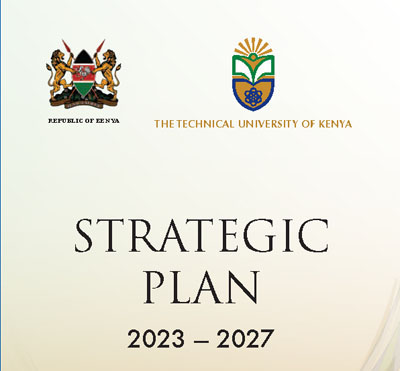Researchers in the East Africa region can now competitively navigate through the research and grants landscape having been trained on how to develop clear, persuasive, and compelling grant proposals. This follows a specialized training workshop titled "Mastering Research Proposals: Integrating Transdisciplinary Approaches for Impactful Research” that was hosted by TU-K from 31st May to 3rd June 2025 at the Main Hall. The workshop was organised by a consortium of organisations, in a bid to enhance a sustainable research ecosystem across countries in the global South, specifically in East Africa.
The consortium includes; Sustainability Research and Innovation Congress (SRI) 2025, the International Science, Technology and Innovation Centre (ISTIC) under the auspices of UNESCO, the National Research Fund, Kenya, the Future Earth Africa Hub, and its Leadership Centre supported by the National Research Foundation South Africa, TU-K, Maseno University, EPIC-Network and the Belmont Forum.
In order to bridge the gap in research funding and elevate research capacities amongst researchers across the global south, the consortium thought it was prudent to convene a workshop that will equip researchers with the skills necessary to craft high-quality proposals for transdisciplinary research.
In this regard, the group of organisations set up a workshop aimed at providing mid-career researchers with fundamental skills in proposal writing, specifically tailored to transdisciplinary research. Through focusing on transdisciplinary approaches, the training workshop also aims to enhance the ability of researchers to develop proposals that address pressing sustainability issues such as climate change, food and water security, and poverty. Additionally, it will also foster a culture of excellence and collaboration.
Following a successful workshop training a total of 51 participants were awarded certificates during the closing ceremony that was officiated by the Vice-Chancellor, Prof Benedict Mutua. He was joined by Prof. Dickson Andala, CEO, National Research Fund, Kenya; Prof. Alfred Orina, DVC, Research and Technology Development (TU-K); Prof. Dr. Mohd Basyaruddin Abdul Rahman, Chairperson International Science, Technology and Innovation Centre (ISTIC) UNESCO Governing Board; and Prof. Dr. Manzoor H. Soomro, Member of the ISTIC Governing Board.
The workshop was officially opened on Saturday 31st May 2025 by the DVC-Academic and Student Affairs, Prof Maurice Amutabi.
Prof Amutabi emphasised the importance of research funding and noted that South Africa was the only country in Africa that spends close to the UN recommended 2.5% of GDP on research. He spoke about the challenges faced by African universities in terms of research proposals development, funding, and human resources, and stressed the need for improvement in these areas.
In his address, Prof. Mutua said that the training workshop was timely, especially for young researchers who need to be guided and provided with techniques on how to develop transdisciplinary grants. He added that in the current research environment donors are keen on funding proposals that are impactful across different disciplines.
As such, the VC encouraged researchers to step out of their area of specialisation, and collaborate with others in order to develop transdisciplinary proposals that are impactful to communities.
“When it comes to research, especially writing for grants, it requires some techniques. But what is important now is that we are no longer assigned to our special disciplines. Our proposals should not only be multidisciplinary, but also trans-disciplinary, cutting across the borders,” said Prof. Mutua.
“Now the field is very open. Therefore, for you to win a grant. You must have partners across the world. Because the issue is, the outcome of this is to have impactful research that is best in the community,” he stressed.
“I'm an engineer. If I write a proposal, and I just focus on engineering, it won't go anywhere,” he teased. “For you to meet societal needs and environmental needs, you need sociologists, you need economists, you need all the disciplines.”
Prof Mutua also encouraged the workshop participants to make good use of the skills and networks acquired to generate impactful research.
“So as we come to the close of this wonderful four days of training, discussion, and learning, I'm sure, we have formed networks and collaborators. Let it be the start of change in terms of how we are going to see research at our individual levels and in our institutions.”
“When you get a call, please, however big or small it is, go for it. I think you are now properly equipped.”
The CEO of the National Research Fund, Kenya, Prof. Dickson Andala, encouraged the participants to translate the knowledge learnt into quality teaching and learning. Further, he applauded the University for investing in capacity building of researchers.
Prof. Alfred Orina, the Deputy Vice-Chancellor, Research and Technology Development, applauded the workshop training for providing a platform that encourages conversations to create transdisciplinary proposals.
“This workshop provides fantastic opportunities for us to be able to build networks and of course coordinate to support certain sectors of the universities. I also believe that after this workshop, the participants will be able to write high quality proposals. We just need diverse conversations and the proposals will be very good,” Orina implored.
Prof. Dr. Mohd Basyaruddin Abdul Rahman, Chairperson (ISTIC) UNESCO Governing Board thanked the participants for their professionalism, hard work and dedication throughout the training. He also encouraged them to apply for international research grants and help advance science, technology and innovation globally.
Professor Dr. Manzoor H. Soomro, ISTIC Governing Board Member and a lead trainer in the workshop expressed optimism in the workshop’s ability to improve the success rate of international grants in the globe south.
“This was a platform for building capacity for transdisciplinary research and strengthening our capacity to conduct transdisciplinary research and craft competitive proposals. To come up with a very high impact proposal, these skills are essential as we face complex and real-world challenges,” explained Dr. Manzoor.
“I hope that the knowledge gained here will help you confidently to apply for international research grants and initiate projects that bring both academic and societal value,” he stressed. “Let us continue the momentum, stay connected, collaborate beyond borders and apply what we have learned,” he added.
The workshop attracted participants from Kenya, Uganda, Tanzania, Burundi, Rwanda, Ethiopia, Malaysia, and Pakistan


